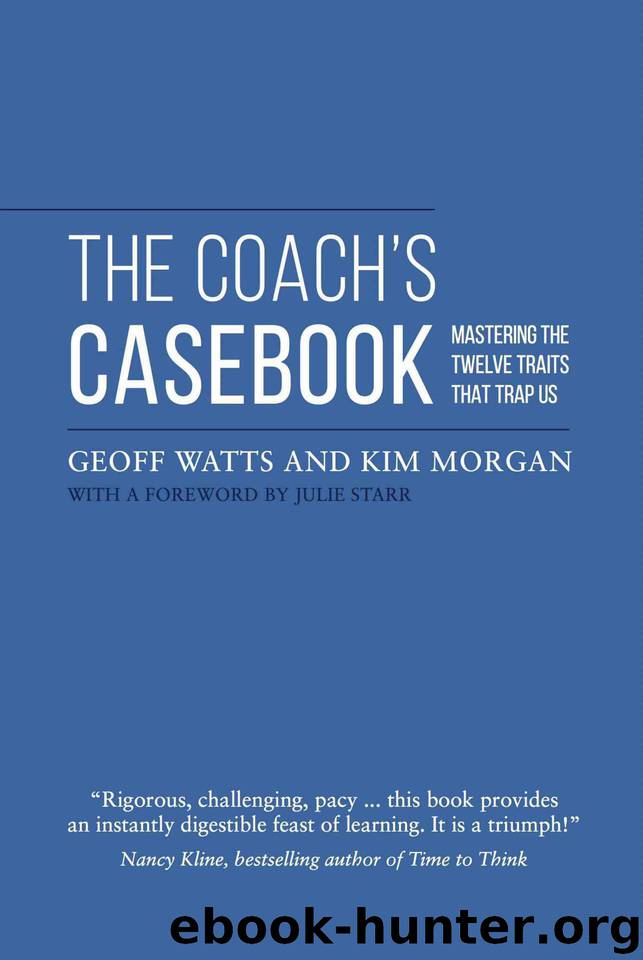The Coach's Casebook: Mastering the twelve traits that trap us by Morgan Kim & Watts Geoff

Author:Morgan, Kim & Watts, Geoff [Morgan, Kim]
Language: eng
Format: epub
Publisher: Inspect & Adapt Ltd
Published: 2015-03-12T16:00:00+00:00
CHAPTER SEVEN
Ostrich Syndrome
‘We don’t see things as they are, we see them as we are.’
ANAIS NIN
THE CASE STUDY
‘Richard’s self-assurance was quite something. I’ve coached many people who are at either end of the self-confidence spectrum but I was beginning to sense that Richard was something else.’
While working on a corporate engagement, I came across a team leader, Richard, who had recently been removed from his position and ‘moved sideways’ to a new, smaller team in a different department. Management officially explained this move as ‘the team requiring some fresh ideas’, coupled with a drop in morale and some high-profile people leaving.
Richard was aware of my presence as I had been coaching some of his colleagues. Although I was not officially available to his new department, Richard asked for some internal budget for coaching to help him settle in to his new role. After many discussions with his previous manager, his current manager, the HR department and others, eventually it was agreed that his previous department would fund his coaching for six sessions.
In his first session Richard couldn’t wait to tell me that he felt extremely hard done by and how certain people had ‘manipulated the situation’ in order to ‘get rid of him’. He was very clear that he wanted to use coaching in order to work out why people had treated him badly and how he could restore his reputation.
‘I’ve been a successful team leader for nearly ten years – a really popular one as well – and, all of a sudden, out of nowhere and with no warning, it all gets taken away from me.’ Richard said, angrily. ‘I’m seriously thinking about taking up a grievance with Human Resources about it. ’
‘I can tell you are very upset about this,’ I replied. ‘It must be a huge blow for you. Although, as I understand it, you are still a team leader, right?’
‘Well yes,’ he reluctantly agreed, ‘but it’s definitely a demotion.’
Richard told me how another member of his team had twisted the output of meetings in order to make him look bad and had gone behind his back to undermine him and impress management so that he could get Richard’s job. Richard was so angry at the ‘sneaky politics’ of the company that for twenty minutes I barely had the opportunity to speak.
There is very little chance of any progress being made in coaching while the client is highly stressed because, during periods of high stress, clients are in ‘survival mode’.
When someone is in ‘survival mode’, their ‘fight or flight’ response is fired [Ref 23] , leading to a number of changes within that person. Firstly, because their focus is very much on themselves and their immediate needs, there is a significant loss of empathy and conscience: they are forced into black and white thinking, assuming that one party must win and one must lose.
As you can probably imagine, this is unhelpful for a coaching relationship. A coach’s first priority in such circumstances is to reduce the client’s stress levels and help the client to reach ‘competency mode’.
Download
This site does not store any files on its server. We only index and link to content provided by other sites. Please contact the content providers to delete copyright contents if any and email us, we'll remove relevant links or contents immediately.
| Conflict Resolution & Mediation | Human Resources & Personnel Management |
| Knowledge Capital | Outsourcing |
Bullshit Jobs by David Graeber(4179)
Radical Candor by Kim Scott(2713)
I Am Right, You Are Wrong by Edward De Bono(2440)
23:27 by H. L. Roberts(2245)
Nomadland by Jessica Bruder(2058)
Average Is Over by Tyler Cowen(1845)
The Conflict Resolution Phrase Book by Barbara Mitchell & Cornelia Gamlem(1773)
Out of Our Minds: Learning to Be Creative by Ken Robinson(1740)
High-Impact Interview Questions by Victoria A. Hoevemeyer(1691)
The Ideal Team Player by Patrick M. Lencioni(1640)
An Everyone Culture: Becoming a Deliberately Developmental Organization by Robert Kegan & Lisa Laskow Lahey(1631)
Who Moved My Cheese?: An Amazing Way to Deal With Change in Your Work and in Your Life by Johnson Spencer(1628)
The Asshole Survival Guide by Robert I. Sutton(1598)
Automatic Society by Bernard Stiegler(1548)
Unleashed by Anne Morriss & Frances Frei(1538)
Who by Street Randy & Smart Geoff(1501)
42 Rules of Employee Engagement by Susan Stamm(1474)
96 Great Interview Questions to Ask Before You Hire by Paul Falcone(1451)
Fish! by Stephen C. Lundin(1398)
